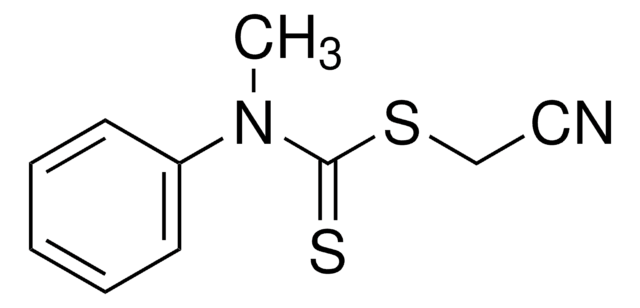749133
2-(Dodecylthiocarbonothioylthio)propionic acid
97%
Sinónimos:
2-(Dodecylthiocarbonothioylthio)propanoic acid, 2-{[(Dodecylsulfanyl)carbonothioyl]sulfanyl}propanoic acid, DoPAT
Seleccione un Tamaño
155,00 €
Seleccione un Tamaño
About This Item
155,00 €
Productos recomendados
Nivel de calidad
Ensayo
97%
Formulario
powder or crystals
mp
78-82 °C
temp. de almacenamiento
2-8°C
cadena SMILES
CCCCCCCCCCCCSC(=S)SC(C)C(O)=O
InChI
1S/C16H30O2S3/c1-3-4-5-6-7-8-9-10-11-12-13-20-16(19)21-14(2)15(17)18/h14H,3-13H2,1-2H3,(H,17,18)
Clave InChI
CFCFZJHCTNKHGJ-UHFFFAOYSA-N
Categorías relacionadas
Descripción general
Aplicación
Palabra de señalización
Warning
Frases de peligro
Consejos de prudencia
Clasificaciones de peligro
Aquatic Chronic 4 - Eye Irrit. 2 - Skin Irrit. 2 - STOT SE 3
Órganos de actuación
Respiratory system
Código de clase de almacenamiento
11 - Combustible Solids
Clase de riesgo para el agua (WGK)
WGK 3
Punto de inflamabilidad (°F)
Not applicable
Punto de inflamabilidad (°C)
Not applicable
Elija entre una de las versiones más recientes:
Certificados de análisis (COA)
¿No ve la versión correcta?
Si necesita una versión concreta, puede buscar un certificado específico por el número de lote.
¿Ya tiene este producto?
Encuentre la documentación para los productos que ha comprado recientemente en la Biblioteca de documentos.
Los clientes también vieron
Artículos
Low-cost, high-purity RAFT Agents are vital for industrial RAFT polymerization. We supply effective agents for this technology.
The modification of biomacromolecules, such as peptides and proteins, through the attachment of synthetic polymers has led to a new family of highly advanced biomaterials with enhanced properties.
Micro review of reversible addition/fragmentation chain transfer (RAFT) polymerization.
Protocolos
We present an article about RAFT, or Reversible Addition/Fragmentation Chain Transfer, which is a form of living radical polymerization.
We presents an article featuring procedures that describe polymerization of methyl methacrylate and vinyl acetate homopolymers and a block copolymer as performed by researchers at CSIRO.
Polymerization via ATRP procedures demonstrated by Prof. Dave Haddleton's research group at the University of Warwick.
Filtros activos
Nuestro equipo de científicos tiene experiencia en todas las áreas de investigación: Ciencias de la vida, Ciencia de los materiales, Síntesis química, Cromatografía, Analítica y muchas otras.
Póngase en contacto con el Servicio técnico
![2-[[(2-Carboxyethyl)sulfanylthiocarbonyl]-sulfanyl]propanoic acid](/deepweb/assets/sigmaaldrich/product/structures/427/606/b02310e2-102e-4324-b09d-e4c0de4fab2c/640/b02310e2-102e-4324-b09d-e4c0de4fab2c.png)
![4-Cyano-4-[(dodecylsulfanylthiocarbonyl)sulfanyl]pentanoic acid 97% (HPLC)](/deepweb/assets/sigmaaldrich/product/structures/204/925/30ae6ca0-5b0b-4963-a061-7e5e3d1a85af/640/30ae6ca0-5b0b-4963-a061-7e5e3d1a85af.png)








![4-Cyano-4-[(dodecylsulfanylthiocarbonyl)sulfanyl]pentanol](/deepweb/assets/sigmaaldrich/product/structures/839/520/64c23004-f340-460f-a379-8670a35d0433/640/64c23004-f340-460f-a379-8670a35d0433.png)




